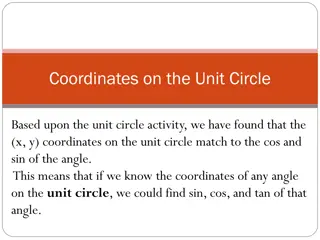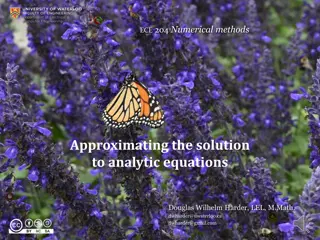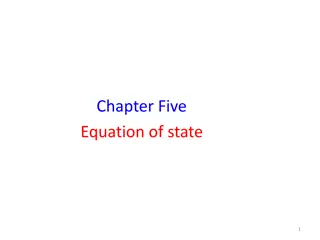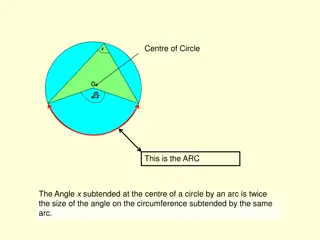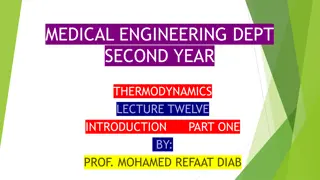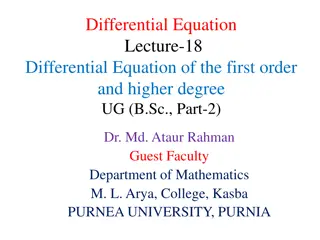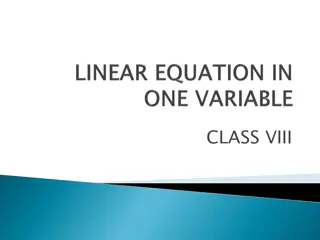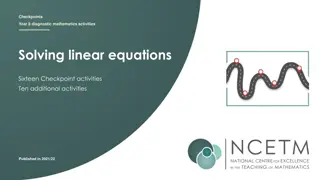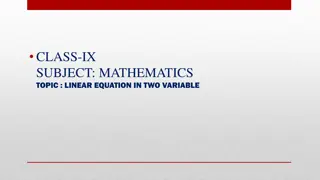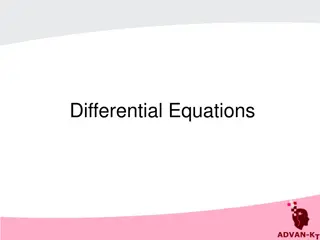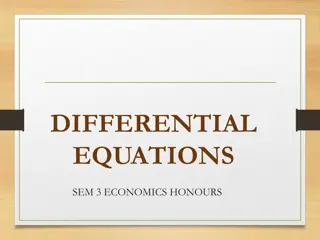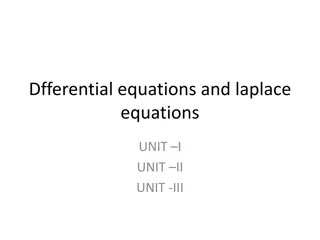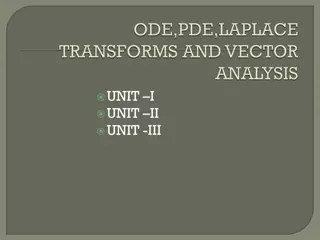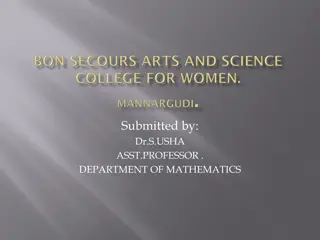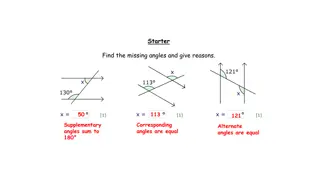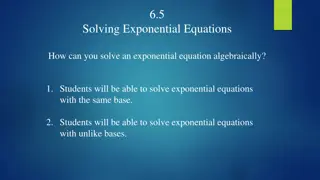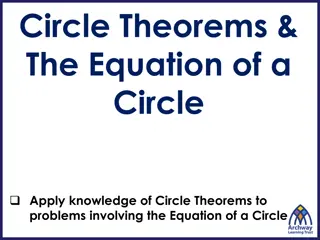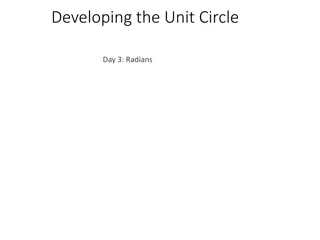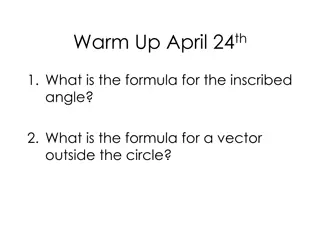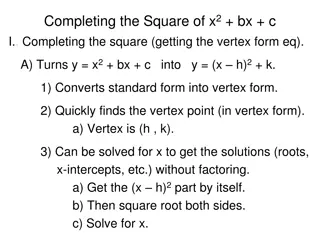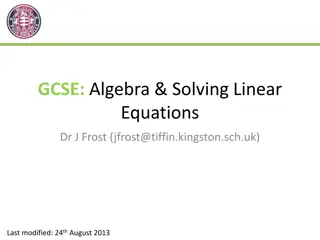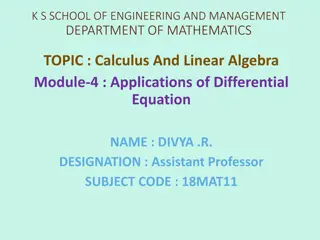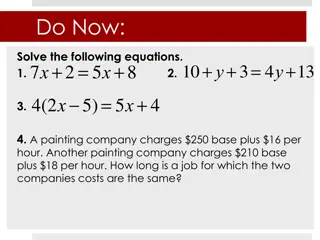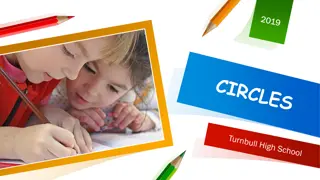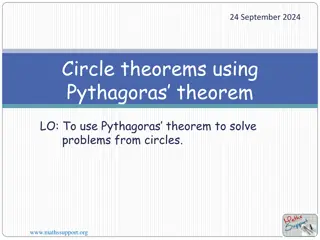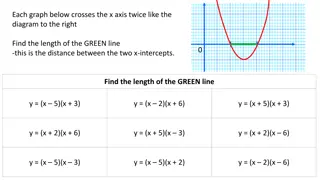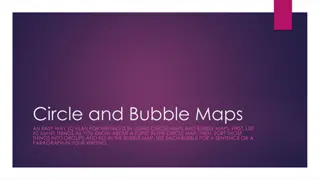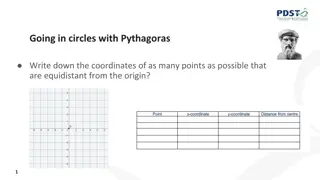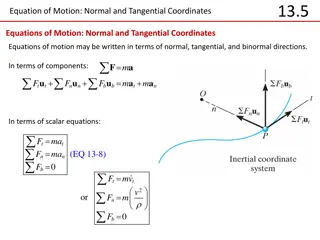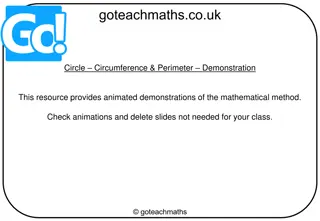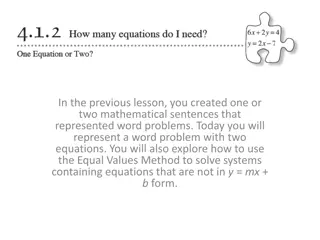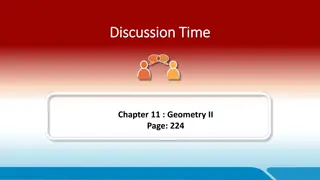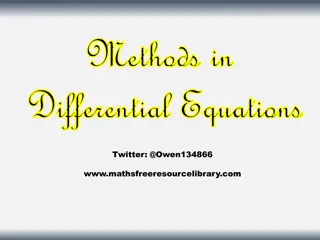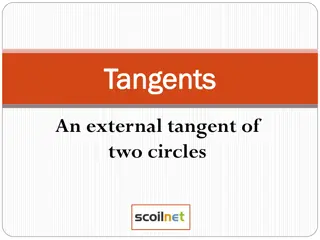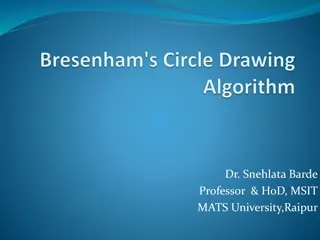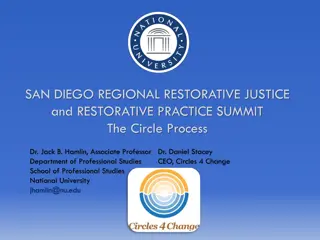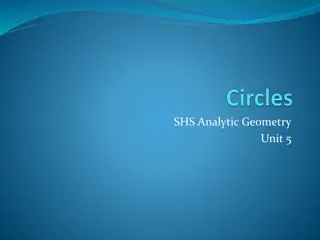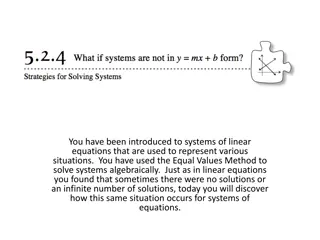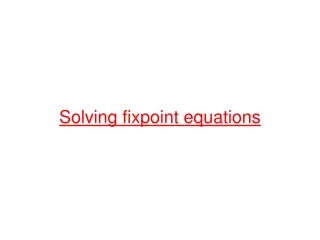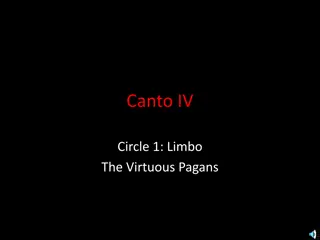Coordinates on the Unit Circle
Exploring how the coordinates on the unit circle correspond to trigonometric functions like sine, cosine, and tangent. Learn how to find these values for angles on the unit circle and how to apply trigonometry principles when points are not on the unit circle.
9 views • 6 slides
Numerical Methods for Approximating Analytic Equations
Introduction to approximating solutions to analytic equations, focusing on differential equations, integral equations, and integro-differential equations. Exploring ordinary and partial derivatives, differential and integral equations, and the involvement of unknown functions and their derivatives a
4 views • 15 slides
Equations of State in Thermodynamics
In the study of thermodynamics, equations of state play a crucial role in predicting the behavior of substances based on pressure, volume, and temperature relationships. These equations define the interdependence of various intensive properties for a simple compressible substance. The development an
0 views • 42 slides
Circle Geometry Principles
Explore key concepts in circle geometry such as angles subtended at the center and circumference, cyclic quadrilaterals, properties of tangents and chords, and the significance of major and minor segments. Uncover relationships between angles, segments, and points on a circle, including alternate se
2 views • 8 slides
Maxwell Equations in Thermodynamics
In thermodynamics, Maxwell equations are derived using Euler's reciprocity relation. They involve characteristic functions such as internal energy, free energy, enthalpy, and Gibbs free energy, along with parameters like temperature, entropy, pressure, and volume. These equations form the foundation
1 views • 15 slides
Differential Equations of First Order & Higher Degree: Lecture 18
This lecture covers differential equations of first order but not of the first degree, general forms of such equations, methods for solving them, and examples of differential equations to be solved. The content includes detailed explanations, equations, solutions, and problem-solving techniques.
0 views • 9 slides
Linear Equations in Algebra: A Comprehensive Overview
An exploration of algebraic expressions, equations, and linear equations in one variable with detailed explanations and examples. Discover the fundamental concepts, solving methods, and applications of linear equations in various word problems. Master the art of transforming mathematical expressions
0 views • 15 slides
Linear Equations Checkpoint Activities for Year 8 Students
This diagnostic mathematics resource for Year 8 students focuses on solving linear equations through a series of Checkpoint and additional activities. Published in 2021/22, the content covers topics such as representing equations with algebra and solving for unknown variables. Students will engage w
0 views • 47 slides
Learning Linear Equations in Two Variables
Understanding linear equations in two variables is essential for solving real-life problems. This topic covers the definition, solution, and graphical representation of such equations, helping students connect mathematical concepts to practical scenarios. By learning to write and solve linear equati
3 views • 31 slides
Differential Equations: Types, Classification, and Solutions
Differential equations are mathematical equations that relate independent and dependent variables through differential coefficients. They can be classified as ordinary or partial, based on the types of derivatives involved. The order and degree of a differential equation, as well as its linearity an
4 views • 26 slides
Differential Equations in Economics Honours
Differential equations, introduced by Newton and Leibniz in the 17th century, play a key role in economics. These equations involve derivatives and represent implicit functional relationships between variables and their differentials, often related to time functions. The order and degree of a differ
1 views • 16 slides
Introduction to Differential Equations and Laplace Equations
Understanding differential equations of various orders, solving methods, linear and non-linear equations, ordinary and partial differential equations, definitions of solutions, and general vs. particular solutions in the context of Differential Equations and Laplace Equations.
4 views • 20 slides
Differential Equations: Basics to Applications
Differential equations are fundamental in mathematics, with various types such as first-order, partial, and Clairaut's equations explored in this content. The content covers general equations, solutions, and examples, providing insights into linear and higher-order equations with constant coefficien
0 views • 20 slides
Partial Differential Equations of Second Order
Exploring the concepts of second-order partial differential equations in mathematics, including the general form, linear equations with variable coefficients, and equations with constant coefficients. Learn about integral solutions, examples, and techniques for solving these equations with detailed
0 views • 21 slides
Geometry Investigations and Theorems
Explore various circle theorems and investigations involving angles, tangents, radii, and circumferences. Discover the relationships between angles at the center and circumference, the properties of tangents, and the angle measurements within a circle. Engage in investigations to understand the sign
7 views • 26 slides
Solving Exponential Equations Algebraically
Learn how to solve exponential equations algebraically with the same base and unlike bases. Understand the properties of equality for exponential equations and practice solving various equations step by step. Improve your skills in rewriting equations with the same base and applying the rules of exp
0 views • 9 slides
Circle Theorems and Equations of Circles
Explore circle theorems and equations of circles in geometry, including concepts like opposite angles in cyclic quadrilaterals, angles on a straight line, and important theorems like the perpendicular bisector of a chord passing through the center of a circle. Learn how to apply these theorems to fi
0 views • 12 slides
Radians: Developing Unit Circle Skills
Exploring radians as a unit of angle measurement and honing unit circle skills through practical examples. Learn how to evaluate angles using the unit circle effectively. Dive into the fundamentals of central angles and their relationship to the radius of a circle for a comprehensive understanding o
0 views • 7 slides
Circles: Formulas for Inscribed Angles and Circumference
Explore the formulas for inscribed angles, vectors outside the circle, and the circumference of a circle. Learn how to calculate the circumference using radius, diameter, or directly measure the arc length. Discover the relationship between arc length and the angle measure in a circle.
1 views • 25 slides
Completing the Square Method: Vertex Form and Solving Equations
The Completing the Square method helps convert quadratic equations from standard form to vertex form, facilitating the quick determination of the vertex point and the solutions without factoring. By completing the square, you transform equations like y = x^2 + bx + c into y = (x − h)^2 + k, enabli
0 views • 5 slides
GCSE Algebra Revision Materials and Equations Practice
Explore a collection of GCSE algebra revision materials, including solving linear equations and common mishaps in algebraic simplification. Practice setting up equations and solving linear equations with provided examples and questions. Enhance your algebra skills through comprehensive content desig
0 views • 15 slides
Applications of Differential Equations in Engineering and Mathematics
Exploring the practical applications of differential equations, specifically focusing on Newton's Law of Cooling and Orthogonal Trajectories. The concept of exact differential equations and their solutions, along with real-life examples demonstrating temperature changes over time, are discussed. Und
0 views • 11 slides
Equations and Painting Costs Analysis
In this lesson, students will solve equations involving variables on both sides to determine the number of solutions. Additionally, a comparison is made between two painting companies based on their pricing structures to find the point where their costs are equal. Various examples and concepts relat
0 views • 12 slides
Circle Parts and Measurements
Explore the different parts of a circle, such as circumference, radius, and diameter, and understand their relationships. Engage in activities to compare lengths of different parts using string. Learn how to draw a circle accurately and deepen your knowledge of geometric concepts.
0 views • 13 slides
Circle Theorems and Pythagoras Theorem in Geometry
Explore the key concepts of circle theorems and Pythagoras theorem in geometry. Learn about the parts of a circle, properties of chords, the relationship between the radius and tangent, and how Pythagoras theorem can be applied to solve circle-related problems like finding distances and lengths. Eng
0 views • 8 slides
Mathematical Problems Involving Graphs and Equations
The content includes a set of mathematical problems related to graphs, equations, and modeling of paths using given equations. These problems involve finding distances, heights, and intersection points based on the provided graph representations. The scenarios involve water sprinklers watering lawns
0 views • 6 slides
Effective Writing Planning with Circle and Bubble Maps
Utilize circle and bubble maps as tools for organizing writing ideas effectively. Begin by listing key points on a circle map and then categorize and elaborate on them in a bubble map. Each bubble can represent a sentence or paragraph in your writing. Finally, use the mapped information to craft a w
0 views • 7 slides
Equidistant Points and Circle Equations
In this engaging content, we delve into the concept of equidistant points from the origin as well as a specific point. We explore the coordinates of such points, their fitting into equations, and extending this learning to circles with various centers. Furthermore, we discuss writing equations for c
0 views • 6 slides
Equations of Motion in Normal and Tangential Coordinates
Equations of motion can be expressed in terms of normal, tangential, and binormal directions. The normal and tangential components play crucial roles in describing the motion of an object. Through scalar equations and component representations, these equations help analyze forces and acceleration in
0 views • 8 slides
Circle Circumference & Perimeter Demonstration
This resource features animated demonstrations explaining the mathematical methods related to the circumference and perimeter of a circle. It includes visual representations and explanations of the relationship between a circle's circumference and diameter using the value of pi (π). Viewers can eas
1 views • 16 slides
Solving Word Problems with Two Equations Using the Equal Values Method
Explore how to represent word problems with two equations and solve them using the Equal Values Method. Learn how to interpret and solve systems of equations with multiple variables to find solutions for real-world scenarios. Practice converting equations into y=mx+b form for easier manipulation and
0 views • 11 slides
Geometry II - Understanding Lines and Arcs in a Circle
This content discusses concepts related to geometry, focusing on lines and arcs within a circle. It explores the properties of lines AB and APB, measures of angles AOB and APB, as well as the shapes formed within the circle. The discussion provides a clear understanding of the terminology and geomet
1 views • 4 slides
Solving Differential Equations: Methods and Techniques
Learn how to solve differential equations using methods like separation of variables and sketch families of solution curves. Understand the process of finding general and particular solutions to equations, and explore a variety of exercises and examples to enhance your understanding. Master the art
0 views • 16 slides
External Tangents of Circles
Discover the construction process of external tangents between two circles, starting from identifying the smaller circle's radius to bisecting lines connecting the point to the circle. Learn how to construct a semi-circle with specified diameters and more.
0 views • 20 slides
Bresenham's Circle Drawing Algorithm Explained
Bresenham's Circle drawing algorithm is a fast and efficient method for drawing circles using integer arithmetic. It divides the circle into octants and selects the nearest pixel positions to create smooth arcs. This algorithm is widely used for graphics applications due to its speed and accuracy.
0 views • 15 slides
Restorative Justice & Practice Summit: Exploring Circle Process and Core Values
The San Diego Regional Restorative Justice and Restorative Practice Summit focuses on the Circle Process, led by experts Dr. Jack B. Hamlin and Dr. Daniel Stacey. Explore the essence of connection, core values, and building safe spaces for re-connection. Delve into universal and Circle values, along
0 views • 10 slides
Circles in Analytic Geometry
Explore the fundamentals of circles in analytic geometry by learning how to derive circle formulas, equation determination, completing the square, proving circle properties, and solving application problems. Discover the definition of a circle, its relation to triangles, and the terms, equations, an
0 views • 51 slides
Solving Systems of Linear Equations: Methods and Applications
Explore various methods for solving systems of linear equations, including the Equal Values Method and solving by inspection. Work through examples involving plant growth rates, job application tests, messy fractions, and more. Understand how to compare coefficients, constants, and graph equations t
0 views • 9 slides
Fixpoint Equations in Programming Languages
Fixpoint equations play a crucial role in programming languages for solving mutually recursive problems like parsing and dataflow analysis. This content explores the concepts of fixpoint equations, assumptions for ensuring solutions, computing solutions, and generalizations for cases with greatest e
0 views • 31 slides
Journey Through Dante's Inferno: Circle 1 - Limbo and the Virtuous Pagans
Dante descends into the first circle of Hell, known as Limbo, where he encounters the Virtuous Pagans - those who were born before Christianity or not baptized. Among them is the great poet Virgil, who explains their fate of living without hope. This circle holds esteemed figures like Homer, Plato,
0 views • 9 slides
